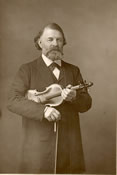Joseph JOACHIM (1831 – 1907)
The Hungarian composer, violonist and conductor JOSEPH JOACHIM was born near what is today the city of Bratislava in Slovakia. The family moved to Budapest, Hungary in 1833, where the boy was given his first violin lessons by the Polish concertmaster of the Royal Opera. Joachim’s extraordinary talent was imemdiately clear.
At the age of seven, Joachim was sent to Vienna, where he studied violin and attended the famous Vienna Academy of Music. Astonishingly, he finished his studies there at the age of twelve.
Joachim spent the following years in Leipzig, Germany, where the great composer, conductor and pianist Felix Mendelssohn became his mentor and role-model. Mendelssohn made sure his pupil was instructed not only on the violin, but in the humanities and art of composition. He took Joachim to London, where the latter first performed Beethoven’s Violin Concerto to great acclaim; Joachim was largely responsible for the work becoming a part of the standard repertoire. Mendelssohn’s concept of art and the artistic personality provided Joachim with an exalted and clear path for his musical and personal development.
Joseph Joachim was 16 when Mendelssohn suddenly died. The loss of his mentor deeply saddened him. In 1849 he went to Weimar, Germany, where he met the famous composers Franz Liszt and Richard Wagner, became concertmaster and composed. Here, his determination to dedicate himself to Mendelssohn’s musical ideals intensified.
In 1852, Joachim took a position in Hannover, Germany, where he lived the next 15 years. He greatly influenced the musical life of the city as concertmaster, general music director and violin soloist. This period also marked close friendships with the composers Johannes Brahms and Robert Schumann.
Joachim is remembered today for being one of the first violonists to perform Johann Sebastian Bach’s solo works for violin in public, especially Bach’s famous „Chaconne“ and Tartini’s sonatas, in particular „The Devil’s Trill“. Many observers found him to be an exceptional artist. His credo was: „the virtuoso exists for the music, not music for the virtuoso“. His „Hungarian Concerto“, although relatively unknown today, is a work of great merit. Some accounts say he practiced constantly, even in train coaches during his frequent concert tours.
In 1866 he left Hannover and later became the founding director of the Royal Academy of Music in Berlin. There, he established his own orchestra and the legendary Joachim Quartet. He was active as an important performer and teacher for nearly 40 years, until his death in 1907. He also conducted the first performance of the Brahms First Symphony in England. Upon his death, the Academy honored him with a bust and monument in the foyer of their Concert Hall. These were later removed and destroyed by the Nazis in their campaign to discredit, destroy and murder Jews. Today, there is an important international violin competition in Hannover that bears Joachim’s name and honors his life.

